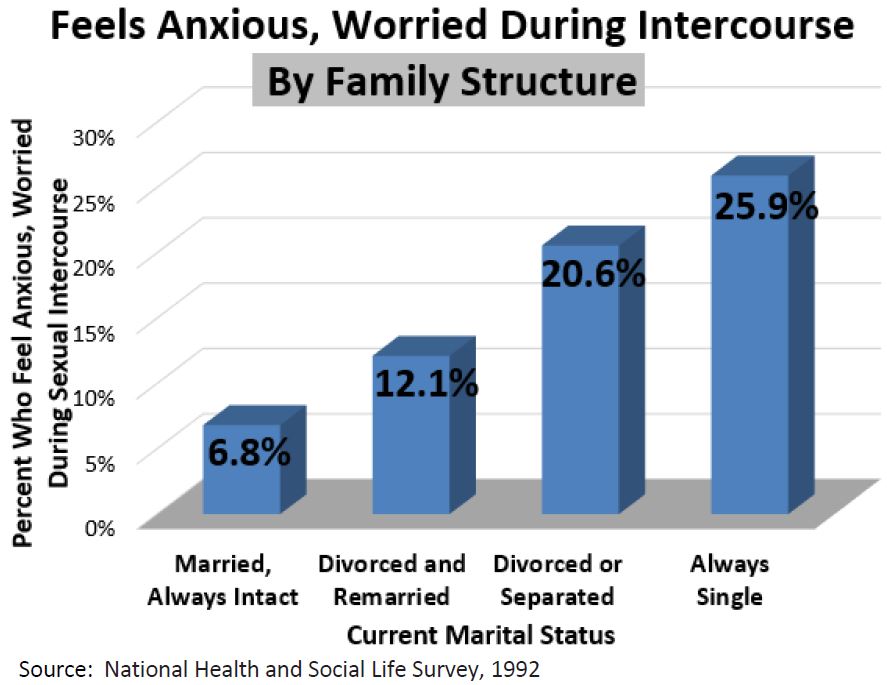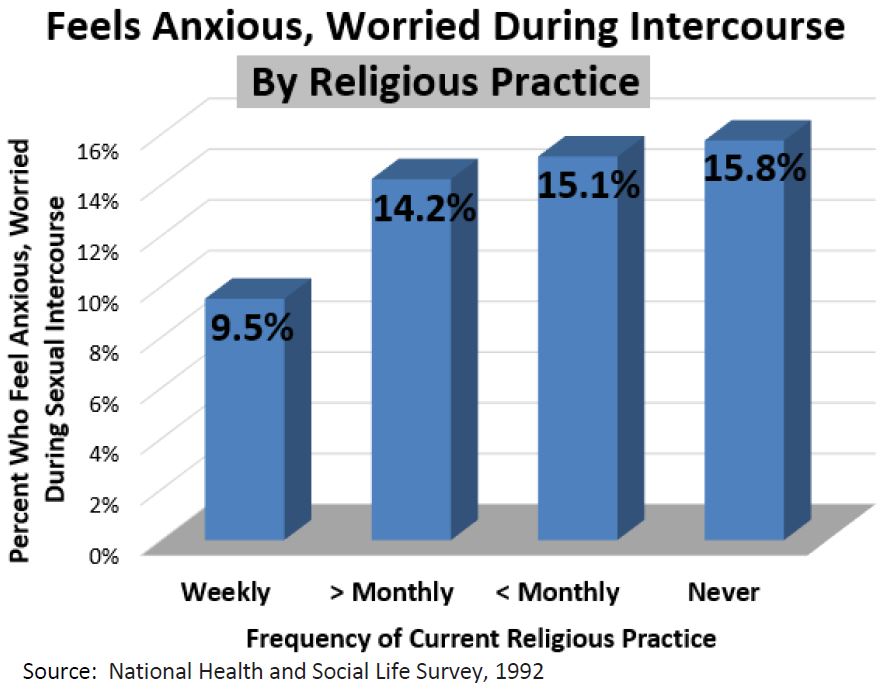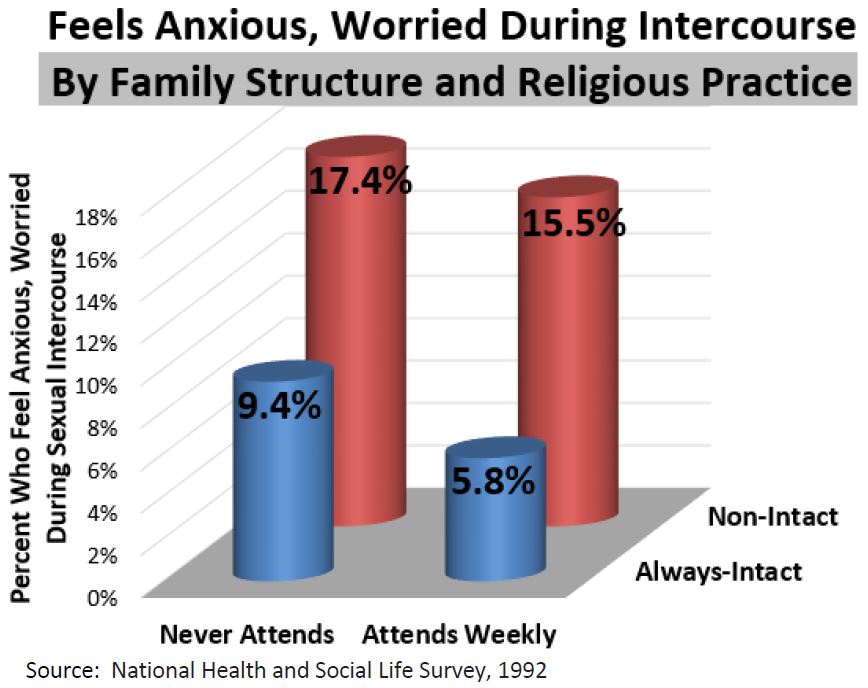Click Here to download “Feels Anxious, Worried During Sexual Intercourse by Family Structure and Religious Practice”
Feels Anxious, Worried During Sexual Intercourse by Family Structure and Religious Practice
Adults aged 18 to 59 in intact marriages who worshiped weekly were least likely to report feeling anxious or worried during intercourse with their current sexual partner, according to the National Health and Social Life Survey (1992).
[1]
Family Structure: Those in always-intact marriages were the least likely to feel anxious or worried during intercourse with their current sexual partner (6.8 percent). Feeling anxious or worried during intercourse was more prevalent among those in non-intact structures and among singles: 12.1 percent of those who were divorced and remarried, 20.6 percent of those who were divorced or separated, 25.9 percent of those who were always single felt anxious or worried during intercourse with their current sexual partner.
 Religious Practice:
Religious Practice: Those who worshiped weekly were the least likely to feel anxious or worried during intercourse with their current sexual partner (9.5 percent). Anxiety during intercourse increased alongside decreased religious attendance: 14.2 percent of those who worshiped less than weekly but at least monthly felt anxious or worried during intercourse; 15.1 percent of those who worshiped less than monthly felt negative or anxious, and 15.8 percent of those who never worshiped felt anxious or worried during intercourse with their partner.
 Family Structure and Religious Practice Combined:
Family Structure and Religious Practice Combined: Those in intact marriages who worshiped weekly were least likely to feel anxious or worried during intercourse with their current sexual partner (5.8 percent), followed by those in intact marriages who never worshiped (9.4 percent). Those in non-intact family structures or who were single and who worshiped weekly were more likely to feel anxious or worried (15.5 percent), and those in non-intact family structures or who were single who never worshiped were even more likely to report feeling anxious or worried during intercourse with their current sexual partner (17.4 percent).
 Related Insights from Other Studies:
Related Insights from Other Studies: A study of the differences in emotional response during sexual activity among sexually functional and dysfunctional men and women found that both men and women with sexual dysfunction experienced less positive emotional reactions during sexual activity. For men, sexual dysfunction led to significantly more negative emotions, including sadness and fear, compared to men without sexual problems. The results were similar among women with sexual dysfunction, who also experienced many negative emotions, including sadness, guilt, and anger.
[2] Findings from the Survey of Adolescent Health indicated that, in addition to demographic factors, being religious reduced the likelihood of early first intercourse for both males and females. The anticipation of negative emotions after intercourse further decreased the probability of sexual debut for both males and females. Among girls only, those who anticipated positive emotions after intercourse had an increased likelihood of sexual debut.
[3]
[1] These charts draw on data collected by the 1992 National Health and Social Life Survey
[2] Pedro J. Nobre and Jose Pinto-Gouveia, “Emotions During Sexual Activity: Differences Between Sexually Functional and Dysfunctional Men and Women,”
Archives of Sexual Behavior 35, no. 4 (2006): 491-499.
[3] Sharon Scales Rostosky, Mark D. Regnerus and Margaret Laurie Comer Wright, “Coital Debut: The Role of Religiosity and Sex Attitudes in the Add Health Survey,”
Journal of Sex Research 40, no. 4 (2003): 358-367.]]>
 Religious Practice: Those who worshiped weekly were the least likely to feel anxious or worried during intercourse with their current sexual partner (9.5 percent). Anxiety during intercourse increased alongside decreased religious attendance: 14.2 percent of those who worshiped less than weekly but at least monthly felt anxious or worried during intercourse; 15.1 percent of those who worshiped less than monthly felt negative or anxious, and 15.8 percent of those who never worshiped felt anxious or worried during intercourse with their partner.
Religious Practice: Those who worshiped weekly were the least likely to feel anxious or worried during intercourse with their current sexual partner (9.5 percent). Anxiety during intercourse increased alongside decreased religious attendance: 14.2 percent of those who worshiped less than weekly but at least monthly felt anxious or worried during intercourse; 15.1 percent of those who worshiped less than monthly felt negative or anxious, and 15.8 percent of those who never worshiped felt anxious or worried during intercourse with their partner.
 Family Structure and Religious Practice Combined: Those in intact marriages who worshiped weekly were least likely to feel anxious or worried during intercourse with their current sexual partner (5.8 percent), followed by those in intact marriages who never worshiped (9.4 percent). Those in non-intact family structures or who were single and who worshiped weekly were more likely to feel anxious or worried (15.5 percent), and those in non-intact family structures or who were single who never worshiped were even more likely to report feeling anxious or worried during intercourse with their current sexual partner (17.4 percent).
Family Structure and Religious Practice Combined: Those in intact marriages who worshiped weekly were least likely to feel anxious or worried during intercourse with their current sexual partner (5.8 percent), followed by those in intact marriages who never worshiped (9.4 percent). Those in non-intact family structures or who were single and who worshiped weekly were more likely to feel anxious or worried (15.5 percent), and those in non-intact family structures or who were single who never worshiped were even more likely to report feeling anxious or worried during intercourse with their current sexual partner (17.4 percent).
 Related Insights from Other Studies: A study of the differences in emotional response during sexual activity among sexually functional and dysfunctional men and women found that both men and women with sexual dysfunction experienced less positive emotional reactions during sexual activity. For men, sexual dysfunction led to significantly more negative emotions, including sadness and fear, compared to men without sexual problems. The results were similar among women with sexual dysfunction, who also experienced many negative emotions, including sadness, guilt, and anger.[2] Findings from the Survey of Adolescent Health indicated that, in addition to demographic factors, being religious reduced the likelihood of early first intercourse for both males and females. The anticipation of negative emotions after intercourse further decreased the probability of sexual debut for both males and females. Among girls only, those who anticipated positive emotions after intercourse had an increased likelihood of sexual debut.[3]
[1] These charts draw on data collected by the 1992 National Health and Social Life Survey
[2] Pedro J. Nobre and Jose Pinto-Gouveia, “Emotions During Sexual Activity: Differences Between Sexually Functional and Dysfunctional Men and Women,” Archives of Sexual Behavior 35, no. 4 (2006): 491-499.
[3] Sharon Scales Rostosky, Mark D. Regnerus and Margaret Laurie Comer Wright, “Coital Debut: The Role of Religiosity and Sex Attitudes in the Add Health Survey,” Journal of Sex Research 40, no. 4 (2003): 358-367.]]>
Related Insights from Other Studies: A study of the differences in emotional response during sexual activity among sexually functional and dysfunctional men and women found that both men and women with sexual dysfunction experienced less positive emotional reactions during sexual activity. For men, sexual dysfunction led to significantly more negative emotions, including sadness and fear, compared to men without sexual problems. The results were similar among women with sexual dysfunction, who also experienced many negative emotions, including sadness, guilt, and anger.[2] Findings from the Survey of Adolescent Health indicated that, in addition to demographic factors, being religious reduced the likelihood of early first intercourse for both males and females. The anticipation of negative emotions after intercourse further decreased the probability of sexual debut for both males and females. Among girls only, those who anticipated positive emotions after intercourse had an increased likelihood of sexual debut.[3]
[1] These charts draw on data collected by the 1992 National Health and Social Life Survey
[2] Pedro J. Nobre and Jose Pinto-Gouveia, “Emotions During Sexual Activity: Differences Between Sexually Functional and Dysfunctional Men and Women,” Archives of Sexual Behavior 35, no. 4 (2006): 491-499.
[3] Sharon Scales Rostosky, Mark D. Regnerus and Margaret Laurie Comer Wright, “Coital Debut: The Role of Religiosity and Sex Attitudes in the Add Health Survey,” Journal of Sex Research 40, no. 4 (2003): 358-367.]]>
